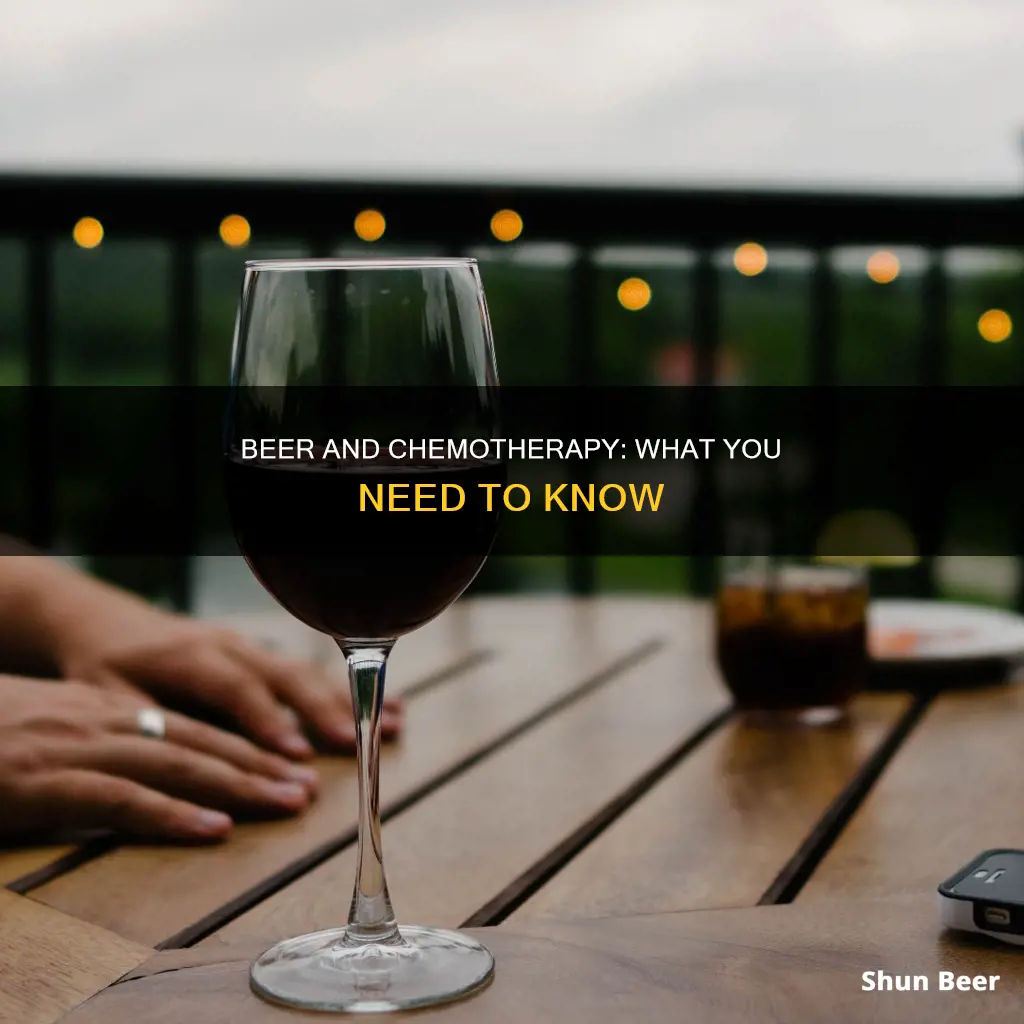
While undergoing chemotherapy, it's natural to be concerned about the toll the treatment may take on your body. It's important to note that chemotherapy targets fast-growing cancer cells, but it can also kill healthy cells, including those in the digestive tract, immune system, and hair follicles. This can lead to various side effects such as hair loss, fatigue, nausea, mouth sores, and changes in your appetite. One common question that arises during chemotherapy is whether it is safe to consume alcohol, such as beer.
The general recommendation is to avoid alcohol during chemotherapy as it can worsen certain side effects and interact with the treatment. Alcohol can irritate the stomach and aggravate chemotherapy-induced nausea and vomiting. It can also make mouth sores worse and increase pain. Additionally, both chemotherapy drugs and alcohol are processed by the liver, and drinking alcohol during treatment can cause liver inflammation, potentially interfering with the effectiveness of chemotherapy.
However, having an occasional beer or glass of wine during chemotherapy is unlikely to have serious effects, according to some sources. It is always advisable to consult with your doctor or healthcare team, as they will be able to provide personalized advice based on your specific chemotherapy drugs and health condition. They can determine if it is safe for you to consume alcohol in moderation or if it should be avoided altogether.
It's important to prioritize your health and well-being during chemotherapy, and making informed decisions about your lifestyle choices, including alcohol consumption, can support your overall treatment journey.
What You'll Learn
- Alcohol and chemotherapy drugs are both processed by the liver
- Alcohol can worsen chemotherapy side effects like dehydration, nausea, and mouth sores
- Drinking alcohol during chemotherapy may increase the risk of recurrence for certain cancers
- Some chemotherapy drugs interact with alcohol, causing side effects like dizziness and drowsiness
- Alcohol can cause liver inflammation, which can interfere with the effectiveness of chemotherapy

Alcohol and chemotherapy drugs are both processed by the liver
The liver is responsible for breaking down and metabolising substances that enter the body, including drugs and alcohol. When someone is on chemotherapy, the liver has to work harder to process the chemotherapy drugs, which are strong medications designed to slow or stop the growth of cancer cells.
At the same time, if a person consumes alcohol, their liver also has to work to process and filter it out of the body. This can lead to liver inflammation, which can interfere with the chemotherapy drugs' effectiveness. The liver plays a crucial role in metabolising and eliminating chemotherapy drugs from the body. By introducing alcohol, the liver may not be able to process the chemotherapy drugs as efficiently, potentially reducing their effectiveness.
Additionally, alcohol can worsen certain side effects of chemotherapy. For example, alcohol can irritate the stomach and aggravate nausea, a common side effect of chemotherapy. It can also make chemotherapy-induced mouth sores worse and increase pain.
It's important to note that the effects of combining alcohol and chemotherapy can vary depending on the specific chemotherapy drugs and the amount of alcohol consumed. Some chemotherapy drugs are known to interact with alcohol, causing or worsening side effects such as dizziness, drowsiness, nausea, and vomiting. Therefore, it's always advisable to consult with a healthcare professional before consuming any alcohol during chemotherapy treatment.
Beer and Wine Mixing: Safe or Sickness?
You may want to see also

Alcohol can worsen chemotherapy side effects like dehydration, nausea, and mouth sores
Alcohol consumption during chemotherapy is generally not recommended, as it can worsen side effects like dehydration, nausea, and mouth sores.
Chemotherapy can lead to dehydration due to vomiting, diarrhea, or excessive urination. Alcohol is also a diuretic, meaning it increases the body's loss of fluids, which can further exacerbate dehydration. This can make it difficult for patients to tolerate necessary chemotherapy treatments and worsen other side effects.
Nausea is a common side effect of chemotherapy, and alcohol irritates the stomach, aggravating these feelings. In addition, some chemotherapy drugs interact with alcohol, causing or worsening nausea and vomiting.
Chemotherapy often causes mouth sores, and alcohol can increase the pain associated with these sores and make them worse.
Both chemotherapy drugs and alcohol are processed by the liver. Drinking alcohol during chemotherapy can cause liver inflammation, interfering with the effectiveness of chemotherapy.
It is best to consult with a healthcare professional before consuming any alcohol during chemotherapy, as they can advise on the specific risks and interactions with your treatment regimen.
Drinking Beer and Playing Saxophone: A Harmful Combo?
You may want to see also

Drinking alcohol during chemotherapy may increase the risk of recurrence for certain cancers
While the occasional beer or glass of wine during chemotherapy is unlikely to have serious effects, it's important to note that drinking alcohol during chemotherapy may carry certain risks. Alcohol can worsen some chemotherapy side effects, such as dehydration, diarrhea, and mouth sores. Additionally, both chemotherapy drugs and alcohol are processed by the liver, so drinking while undergoing chemotherapy can place additional stress on this organ.
Furthermore, drinking alcohol during chemotherapy may increase the risk of recurrence for certain cancers. Studies have shown that alcohol intake by cancer survivors is associated with a higher risk of cancer returning. For example, research indicates that breast cancer survivors who consumed more than three to four drinks per week had a higher risk of recurrence. This risk is not limited to a specific type of cancer, as drinking alcohol is linked to an increased risk of several cancers, including breast cancer and colorectal cancers.
The link between alcohol consumption and cancer recurrence is partly due to the presence of ethanol in alcoholic beverages. When the body breaks down ethanol, it produces acetaldehyde, a known carcinogen that damages DNA and inhibits cells from repairing that damage. This can create an environment conducive to the growth of cancerous cells.
Additionally, alcohol can affect hormone levels, such as estrogen, which act as messengers that stimulate cell growth and division. The more cells divide, the higher the chances of something going wrong and cancer developing. Alcohol consumption can also interfere with the absorption and utilization of essential nutrients, such as vitamins and minerals, that play a crucial role in immunity, cell protection, and DNA synthesis and repair.
It's important to consult with your healthcare team before consuming any alcohol during chemotherapy. They will advise you based on the specific drugs you are taking and your individual circumstances. Excessive drinking is never recommended, regardless of the type of chemotherapy you are undergoing.
Beer and Cider: Perfect Pairing or Poor Mix?
You may want to see also

Some chemotherapy drugs interact with alcohol, causing side effects like dizziness and drowsiness
It is important to consult your doctor or healthcare team before drinking alcohol while on chemotherapy. While an occasional beer or glass of wine during chemotherapy is unlikely to have serious effects, some chemotherapy drugs can interact with alcohol and cause side effects such as dizziness and drowsiness.
Matulane (procarbazine), a chemotherapy drug used for the treatment of stage 3 and stage 4 Hodgkin lymphoma, interacts with alcohol and can increase side effects in the central nervous system. These side effects include loss of balance, headaches, drowsiness, and dizziness. Similarly, combining alcohol with Gleostine (lomustine), used for Hodgkin lymphoma and metastatic brain cancer, can lead to nausea and vomiting.
In addition to these chemotherapy drugs, alcohol can also interact with medications used to support cancer treatment, such as painkillers, anti-anxiety drugs, and anti-nausea medications. For example, Ultram (tramadol), a painkiller, can cause excessive drowsiness and confusion when mixed with alcohol. Anti-anxiety drugs like Xanax (alprazolam) and Ativan (lorazepam) can cause extreme sleepiness, difficulty concentrating, and slowed breathing when mixed with alcohol. Furthermore, anti-nausea drugs like Zofran (ondansetron) can lead to extreme drowsiness, dizziness, and loss of coordination when combined with alcohol.
It is crucial to be aware of these potential interactions and side effects and to consult your healthcare team to determine if your specific chemotherapy treatment interacts with alcohol. They can provide personalized advice and recommendations based on your individual situation.
Digging Dogs and Beer: A Dangerous Mix?
You may want to see also

Alcohol can cause liver inflammation, which can interfere with the effectiveness of chemotherapy
Alcohol can have a detrimental effect on the liver, causing inflammation. This is particularly dangerous for those undergoing chemotherapy, as the liver is responsible for processing both alcohol and chemotherapy drugs. Liver inflammation can therefore interfere with the effectiveness of chemotherapy, as it impacts the liver's ability to metabolise chemotherapy drugs.
Chemotherapy drugs are designed to target fast-growing cancer cells, but they also kill healthy cells that divide quickly, such as those in the digestive tract, immune system, and hair follicles. This can lead to side effects like hair loss, nausea, and lowered immunity.
Drinking alcohol while undergoing chemotherapy can place additional stress on the liver, potentially interfering with the effectiveness of the treatment. It can also worsen chemotherapy side effects such as dehydration, mouth sores, and nausea.
Some chemotherapy drugs interact with alcohol, causing or worsening side effects such as dizziness, drowsiness, and vomiting. For example, drinking alcohol with Matulane, a drug used to treat Hodgkin lymphoma, can increase central nervous system side effects like loss of balance, headaches, drowsiness, or dizziness.
It is important for patients to consult their doctor or healthcare team before consuming alcohol during chemotherapy, as certain chemotherapy drugs and medications may interact with alcohol. Excessive drinking is generally not recommended for those undergoing chemotherapy.
Flat Beer: Is It Safe to Drink?
You may want to see also
Frequently asked questions
It is not advisable to drink beer or any other alcoholic beverage during chemotherapy as alcohol can irritate the mouth and worsen mouth sores, a common side effect of chemotherapy. Alcohol is also processed by the liver, which can cause inflammation and interfere with the breakdown of chemotherapy drugs.
While having an occasional beer is unlikely to have serious effects, it is important to check with your doctor first. Some chemotherapy drugs can interact with alcohol and cause side effects such as dizziness, drowsiness, nausea, and vomiting.
Alcohol can worsen many of the side effects of chemotherapy, such as dehydration, diarrhoea, and mouth sores. It can also cause liver inflammation, which can interfere with the effectiveness of chemotherapy drugs.
This depends on several factors, including the type of chemotherapy treatment, the type of cancer, your immune system, any ongoing side effects, and other medications you may be taking. Consult your healthcare team to determine if and when it is safe for you to consume alcohol.
It is important to avoid alcoholic beverages during chemotherapy and instead focus on staying hydrated by drinking plenty of water and other non-alcoholic fluids.







